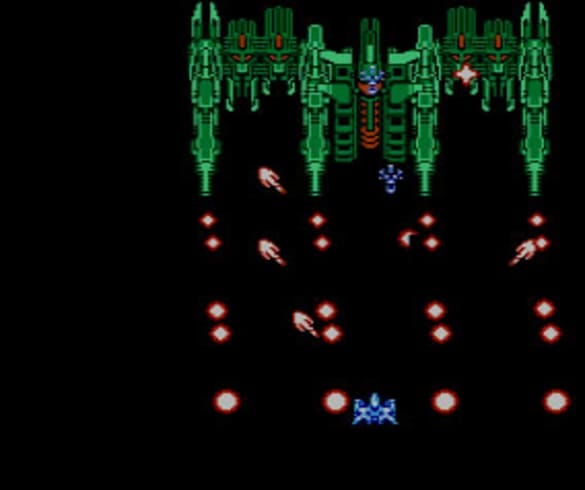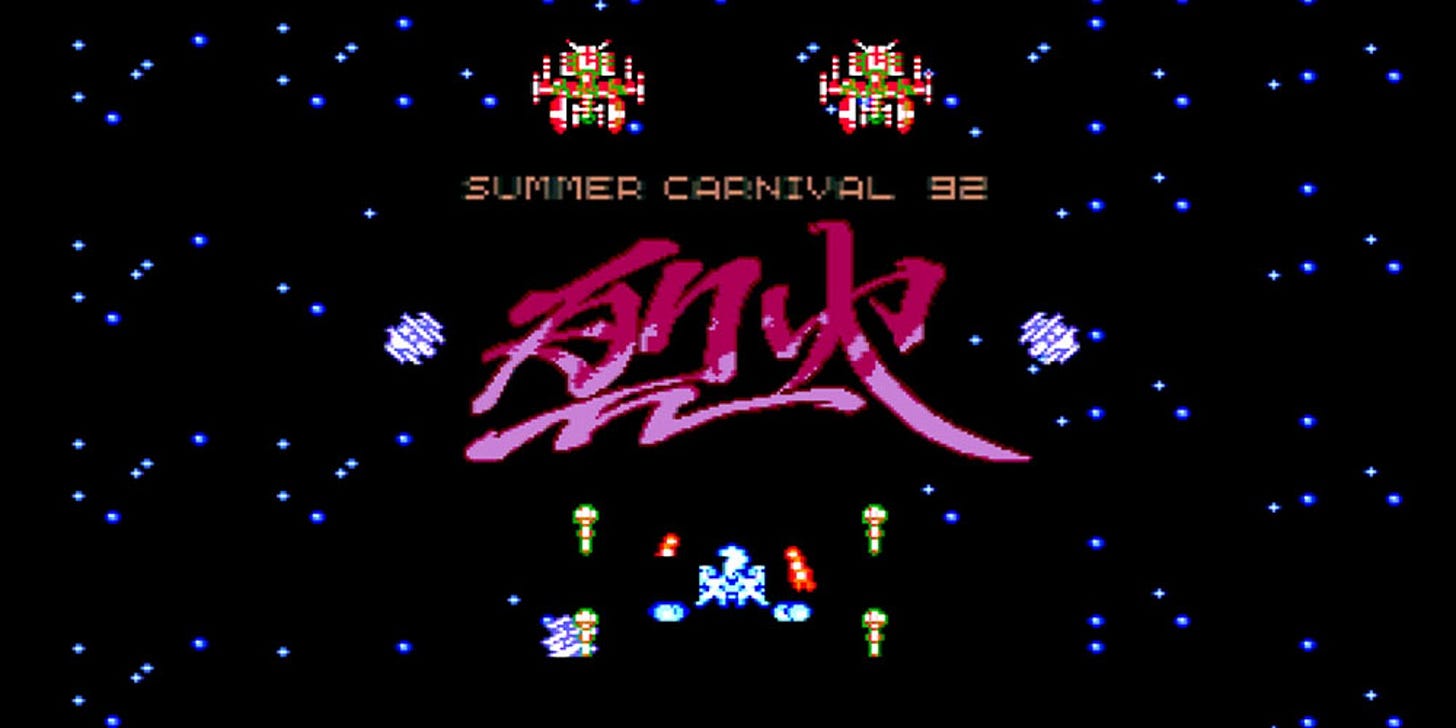This column is “Re-release this,” which will focus on games that aren’t easily available, or even available at all, but should be once again. Previous entries in this series can be found through this link.
Are you familiar with caravans as they relate to video games? I won’t bog you down too much with the history of them here, but they were basically Japanese festivals where people would compete to post top scores in a chosen game: Hudson Soft was extremely famous for these events back in the 80s, and they are why “Caravan Mode,” timed sessions of two or five minutes that existed solely for the purpose of racking up as many points as possible while you could, is a thing you would find in shoot em ups both then and now. Maybe you remember Blockbuster Video hosting summer tournaments in their various locations using modified versions of games like Donkey Kong Country or Judge Dredd, with a similar purpose of posting the highest scores.
Hudson wasn’t the only company making games that would be used in caravan events, though. Naxat was another publisher that participated in this sort of thing, which is where Summer Carnival ‘92 Recca, or just Recca, comes in. While the likes of Star Soldier and Hudson’s other caravan offerings weren’t particularly difficult, and the caravan modes more about figuring out how to string together multipliers for as long as possible while the clock was still ticking, Recca was different. Recca was designed in such a way that trying to survive long enough to log two or five minutes was its own achievement, never mind posting the highest score of anyone playing the game during the event.
Recca, developed by KID, is extremely fast-paced, and loads the screen up with enemy ships, obstacles, and bullets. It’s actually shocking how quickly and smoothly it all works, and just how many objects end up on screen, considering that it’s a Famicom game. For a long time, you needed to import Recca (and to have a Famicom) to be able to play it legally, but in 2013, it was released on the Nintendo 3DS eShop for just $5. While I cannot personally attest for the differences between the versions, Hardcore Gaming 101’s Kurt Kalata wrote that, “The blurry visuals of the emulation don’t do the game any favors, and it’s not quite as impressive on the small screen, but it’s playable.”
From reading that write-up of Recca, watching some videos of the original, and playing the 3DS version on my own, too, I’ve inferred that it has more flickering than the original ever did, as well. None of this stops you from experiencing Recca in an enjoyable fashion, but it sure would be great if an updated version of it existed, or at least one that was better emulated: that’s part of why you’re seeing a game that’s actually still available for purchase under the “Re-release this” banner, by the way. Because we can do better.
Let’s talk about how Recca plays before diving in any further on that note, though. You can complete Recca, sure, but as said, that’s not really the primary purpose behind the game. It is, at least for a little while, simply to survive Recca for as long as you can, racking up higher scores and play times with practice. While some ideal shoot em ups are ones that take roughly 30 minutes to play through and give you a reason to go back, Recca, for me, has been more like a game I pick up when I don’t have 30 minutes, but I do have 5-10 to spare.
The game as a whole doesn’t take very long to finish, assuming you are capable of doing that, as there are just the four stages and a boss rush to complete. Getting to the point where you can do that is the real challenge, however, and if you manage that much, then a hard mode unlocks with seven stages in total and new, more difficult arrangements of the original ones you’ve already mastered. This game is rude as hell, which, if you’re into that, is a reason to check it out.
There are no continues in Recca, just the lives you start with. You can earn more by defeating enemies, as sometimes a 1-up will be dropped, and you very well might need every one you can find in order to progress. Luckily, power-ups are extremely plentiful, to the point that you can be picky about them: in some shooters, you might just grab whatever weapon comes floating down to you, but in Recca, you should consider sticking with whatever is working best for you, be it the narrow-range but high-damage laser, or the V-shaped rapid-fire tri-shot that is relatively weak but is also the most thorough, real-estate-wise, of your potential weapons.
There is a gimmick here worth exploring beyond just “is fast-paced and tough,” thankfully. And that is the ability to generate a shield that will protect you from bullets — but, and this is important to remember, not lasers. You can only generate this shield when you aren’t firing your ship’s weapons, and it takes a few seconds to build up, but will stay with you until you resume firing. The bosses in the game have what are, as far as I can tell, completely unavoidable bullet-hell-esque patterns to them, so you need to learn to time when to stop firing in order to bring up your shields and save yourself. During the non-boss sections, the shield can be useful, but you might be better off, for the most part, firing and firing and firing, while dodging what can be dodged, in order to rack up the most points.
When you do fire and put an end to your shield, though, the energy that was just protecting you becomes a bomb that will destroy any regular enemies it comes into contact with, and does damage to bosses as well. So when it makes sense to stop firing in order to get that bomb — which isn’t quite screen-clearing but will certainly blow a hole in an enemy wave or three while its blast persists — you should do that, too. It’s all a balance, but it’s also memorization, as you’ll need to remember when it’s best to do what and then actually pull whatever “what” it is off in time to keep yourself from dying.
Recca is a genuine blast to play, even in its diminished, emulated, 3DS form. It’s certainly not for everyone, since it is punishing and will require you be into the idea of replaying the same few minutes at a time again and again until you’ve mastered them, but if you’re into that, you’ll love it. There is a “normal” mode, which is basically just “here is the home version of the game,” and there are also time and score attack modes that change the layout while adding obstacles you can either die by crashing into, or blow up in order to secure the point bonuses inside. You might be doing that instead of firing at a wave of enemies, though, so like with everything else in Recca, it’s all a balance you need to figure out in order to pull off the most successful run possible.

The only real issue with Recca is that the definitive version of the game basically doesn’t exist. The Famicom one is a technical marvel that pushed that system to its limits in a way that honestly shocks me, yes, but it’s a technical marvel from 1992, and one that didn’t get an international release. The version the rest of the world can buy released on a last-gen handheld, and is, compared to the original, compromised a bit on the technical side. We need a Recca that is widely available, and successfully delivers on the ambition KID had for the original. We need M2 or someone like that to get their hands on it, to give the game some quality of life updates, as they do in their ShotTriggers series. Maybe Recca should get a remaster on both the audio and visual sides of things, while retaining the original version of the game somewhere in there as is sometimes a thing that happens, like with the recent Cotton Reboot! that includes a remaster of the original Cotton title as well as the actual X68000 edition it’s based on.
It certainly wouldn’t be the strangest revival we’ve seen in this shmup renaissance, but it would absolutely be a welcome one. Play Recca on the 3DS if you can, or emulate the original Famicom version if that’s what you need to do. But if you’re into extremely challenging shmups, then Recca, a game designed with surviving a high-score tournament in mind, is what you’ve been looking for.
This newsletter is free for anyone to read, but if you’d like to support my ability to continue writing, you can become a Patreon supporter, or donate to my Ko-fi to fund future game coverage at Retro XP.


